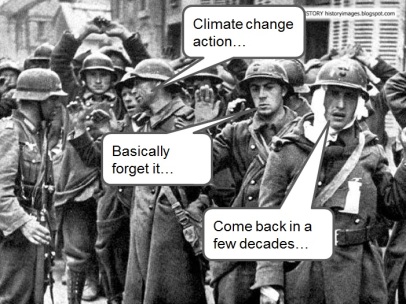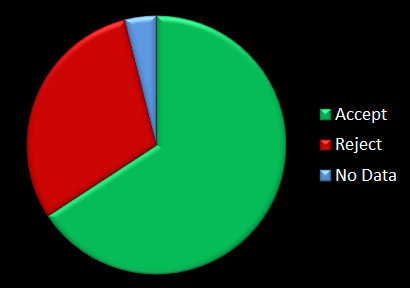It is telling that one of the very the first acts of the incoming Abbott government was the dismantling of Climate Commission and the sacking of Tim Flannery.
Moves are also under way to wind up the Clean Energy Finance Corporation (CEFC) and repeal the “carbon tax”. The freshly minted Environment Minister, Greg Hunt has dismissed the CEFC as as a speculative hedge fund:
Mr Hunt labels the corporation a green hedge fund, “borrowed in taxpayers’ name for investing in speculative ventures”
Without doubt this little piece of Orwellian cant is meant to associate investment in renewable energy with risky financial speculation.
As Michelle Grattan noted in The Conversation, a select few high-profile public servants have been the victim of their association with Labor’s carbon price:
“One of the strikes against [Martin] Parkinson was that he headed the then Climate Change department and was at the centre of Labor’s work on a carbon price. This was particularly in the mind of some in the Abbott office.”
Grattan also expressed a fear many in the science community must be feeling:
“The CSIRO comes under the Industry department. The scientists working in the climate area might be getting a little nervous.”
Indeed, however it is not just climate scientists who are nervous.
Cheering on the planet’s destruction: the sceptic response
Of course the denial movement has been in an orgiastic state of schadenfreude in response to these cuts.
The Herald Sun’s Andrew Bolt demands Tim Flannery refund his salary for his “dud predictions”; conspiracy theorist Jo Nova calls it a “win for Australia”; American blogger Anthony Watts gloats in several posts, dismissing Flannery as a “high paid fool”.
There are of course many more examples of such thinly veiled pleasure in the misfortune of others.
Sitting above this scrum of sceptic bloggers and News Corp hacks, presiding over events like a bad caricature of Ann Ryan’s John Galt, is Rupert Murdoch:
Abbott, the LNP, Murdoch and the sceptics have turned back time. They desire nothing more than to wipe from Australia’s political and cultural memory the years 2007-2013.
It is as if the last five years didn’t happen: no first woman prime minister; no Labor in power; no price on carbon; no pesky scientists to remind us of the dangers of climate change.
Down the memory hole they go.
A great first day indeed.
Climate change as lighting rod for conservative anxieties in a changing world
The culture war fought over climate science has raged for more than three decades.
During this period the forces of obstruction had the upper hand in Australia, especially during the Howard years. But their ascendancy was broken in Australia in 2007 with Rudd’s election.
For a few brief years it seemed Australia might take substantive action on climate change: the signing of the Kyoto protocol; the introduction of the carbon price; greater public acceptance of the science and the desire to act.
Thus 2007 represented a wrong in the eyes of the LNP and conservatives that had to be righted. In response we have witnessed five years of rage and fury.
And while some may think these events are about climate change, they aren’t.
It is about the soul of the nation: it is what Australia could or should be.
Murdoch, Abbott and the gaggle of sceptics looked out at the world and the shift in our culture and feared what they saw. They are of course differences among all these individuals and the groups they represent. But what united and drove them was hatred of the scientific consensus on climate change.
Climate change has become a lighting rod for conservative anxieties and fears about a rapidly changing world.
What do individuals do when they feel their “culture” is under attack?
They mount a counter-offensive.
This is what the 2013 Abbott victory represents, a cultural coup d’etat.
Conservatives fear the evolution of Australia’s culture: one that embraces sustainability and equality; one that rejects the values of the past; one that places the market second to the needs of society; one that embraces a post-materialist world view.
Expunging the heresy of climate science: why we should be concerned for science in Australia
Abbott is keen to project an orderly transition to power, but his targets demonstrate a quiet rage and considered preciseness.
As Flannery noted in his press conference following his sacking:
“As global action on climate change deepens, propaganda aimed at misinforming the public about climate change, and so blunting any action, increases.”
This should send a chill down the collective spine of scientific community. It remains to be seen how this will play out, but the signs are ominous.
When the Canadian conservatives under Stephan Harper’ got into power they began a war on science and withdrew from the Kyoto treaty. A war on science was also a feature of George W. Bush’s Presidency, notably recorded by Chris Mooney in “The Republican War on Science”.
We may see similar events play out under the Abbott government: the heavy hand of Liberal Party apparatchiks in muting or censoring reports; the defunding of climate research programs; obstruction at climate conferences; more sackings; and pressure on the science community to remain silent on climate change.
Of course it will all be done in the name of savings, efficiency and small government. It will be done in the name of a “mandate”.
But the targets make it obvious.
Welcome to a renewed phase of the climate culture wars.










